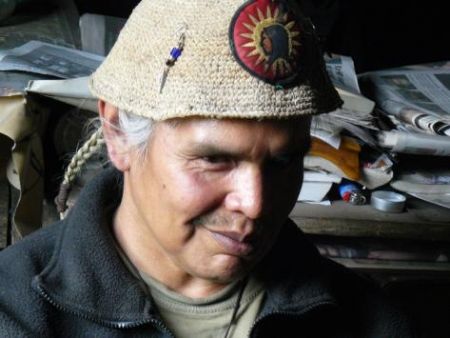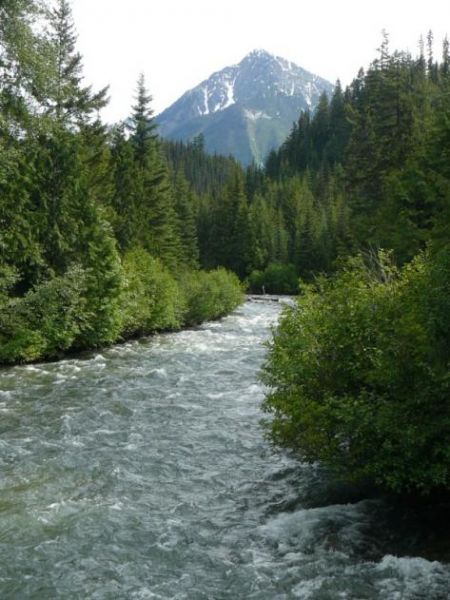STORY about SolidarityIndigenousIdeas posted on July 8, 2009 by AuroraDiana
A simple stand
A day in the mountains with Hubie at Sutikalh
There is a place near Whistler, that, despite its physical proximity, is worlds away from ski resort territory. Sutikalh is a camp that was established on May 2, 2000 and still stands as the St’at’imc nation’s open refusal to allow it, too, to be ‘developed.’
Upon hearing of government and corporate plans to build a $500 million all season ski and recreation resort in this untouched Alpine mountain area, members of the St'at'imc nation decided to make the Sutikalh camp permanent, voicing their rallying cry against the continued territorial trespassing of government and corporate interests on this still unceded land.
Hubert Jim, or Hubie, as he prefers to be called, has been living off the land at Sutikalh for nine years. When asked why he is there, his responses are simple and non-violent, a mirror of his interconnected world view. “I am here because I was asked [by the community] to come in and protect this place. I am here as a voice for those who cannot speak for themselves.”
Part of the Cayoosh Moutain Range, the region is the natural habitat of grizzly bears, cougar, bobcat, wolverine, deer, hawks, owls, and contains one of the largest herds of mountain goats now remaining in North America. The nearby river is one of two pristine water sources left in the area, which has also been used traditionally as a spiritual and cultural meeting place for centuries.
It doesn’t take much to see why this land is so sought-after: a brief walk in the surroundings of Sutikalh’s simple cabin-and-tents setup confirms its value—both environmental and spiritual—to any passing visitor.
Of which Sutikalh has many: in the spirit of its tradition, the camp has become somewhat of a center for back-to-the-land education in the past decade. Though the impetus for its creation was political, its resilience has come to expand the original anti-development mission.
“People from one hundred and ten countries have come here, trying to learn how to live,” claims Hubie. In this vein, he does not see in Sutikah a statement merely representative of his own community; it is a basic struggle, as he sees it, for the world. “I’m thinking of the future—our future—all of our future.”
The mission, however, is expansive only in terms of its reach: “It’s just a simple little struggle about maintaining a way of life.”
Hubie jokes that instead of a ski resort, Sutikalh has become a “holiday resort for all radicals. People come here to recharge, to release all of that negative energy, and to go back out again.”
It felt like just that.
Despite its presence for a decade, there has been almost a complete absence of mainstream media coverage on Sutikalh. Though this seems shocking, the camp regardless receives hundreds of visitors from across the globe, year after year, all by word of mouth.
Looking through their large books full of photos, letters and clippings, it is truly staggering to see: busloads of Japanese friends coming to visit for several weeks, letters of solidarity arriving from Patagonia, Argentina, all manner of Europeans travelers, and British Columbians from diverse walks of life, too, have passed through Sutikalh to learn about life on that land, and stand in solidarity with the St’at’imc nation.
“My community is everybody who walks through those gates,” Hubie says, pointing to the camp entrance. Like everything else that stands on the land, it was hand-built by the camp’s inhabitants.
Though certainly, not all visitors are friends.
“The government response has been a heavy foot and hand from day one. Be a good Indian they tell me.” Though under constant surveillance and hostility—which only increases with the upcoming Olympics—he isn’t angry.
Instead, Hubie is a questioning soul: “I have been told the battle we will be fighting will not involve weapons—it’s a spiritual battle. Where is that balance we all seek? We need to turn our anger and rage to positivity.” Which is just what he, the St’at’imc nation and all visitors to and supporters of Sutikalh are doing, day by day.
“I’m just living the role I’ve been given,” he states, simply, once more. Though it isn’t a solitary stand, as he reiterates to us in parting: “The door is always open.”
For more information about Sutikalh, visit: sutikalh.resist.ca/
Photo of Hubie at the camp and of the Cayoosh mountain range by Maya Rolbin-Ghanie.
The site for the Vancouver local of The Media Co-op has been archived and will no longer be updated. Please visit the main Media Co-op website to learn more about the organization.


Comments
Sutikalh Blog
This is a very good article, I am sure Hubie would be pleased with it.
I just wanted to mention that I have started up a blog about the Sutikalh this week, and will be posting on a pretty regular basis.
I am hoping to get up to the camp to see Hubie in early September.
Sutikalh Blog
http://sutikalh.blogspot.com